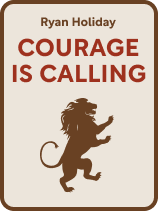

This article is an excerpt from the Shortform book guide to "Courage Is Calling" by Ryan Holiday. Shortform has the world's best summaries and analyses of books you should be reading.
Like this article? Sign up for a free trial here.
Do you believe that you are responsible for your own actions, even if the outcomes aren’t what you intended? Do you feel justified in making excuses?
Courage involves saying and doing the right thing. This includes taking responsibility for your words and actions, even when they lead to negative outcomes. Ryan Holiday writes about this aspect of Stoic courage in his book Courage Is Calling.
Continue reading to understand how you must accept responsibility for what you say and do, no matter what.
You Are Responsible for Your Own Actions
Part of being courageous means accepting that you are responsible for your own actions, especially when something goes wrong or your actions have unintended consequences. We all have moments where even our best intentions get us into trouble. What matters most is how we respond. Holiday states that courageous people don’t try to make excuses, pass blame, or quit when they’re under scrutiny.
Let’s say that you’re in a meeting at work, and a supervisor makes an inappropriate comment about one of your coworkers behind their back. The easy option would be to stay silent and move on since the situation doesn’t affect you directly. The hard option would be to speak up in defense of your coworker, or maybe even report the supervisor’s actions to human resources. You might be afraid that repercussions from the supervisor will affect your prospects at work, but this shouldn’t stop you from acting.
Rather than letting that fear control you, Holiday argues that you should let it point you toward the path of virtue, which would be protecting your coworker when they can’t do it for themselves. If you don’t speak out, he warns that you’ll lose something far more precious than any material thing—your integrity and self-respect.
Let’s say that, after you speak out against the supervisor, your coworker comes to you upset, saying you had no right to speak for them and that you should have talked to them first about what the supervisor said. Instead, you embarrassed them, and it negatively affected their work life.
Your first instinct may be to get annoyed that your coworker’s being ungrateful or make excuses that shift the responsibility for their problems away from you. However, even if it’s not your fault, and you still feel you did the right thing in the moment, your actions had unintended consequences. According to Holiday, the brave thing to do would be to acknowledge your part in your coworker’s hurt while standing firm in your decision.
(Shortform note: In The 10X Rule, Cardone also discusses the importance of taking full responsibility for your actions. He argues that to be successful, you have to recognize that things don’t happen to you—things happen because of you and the actions you take. If you’re willing to take credit for successes, you should be equally willing to take credit for failures. Believing you’re merely a victim of circumstances created by other people gives those other people control over you, reinforcing the false belief that you’re helpless. Like Holiday, Cardone states that while you can’t control everything that happens to you, you can always control how you respond. Taking responsibility in moments when you make mistakes allows you to actively improve your life going forward.)

———End of Preview———
Like what you just read? Read the rest of the world's best book summary and analysis of Ryan Holiday's "Courage Is Calling" at Shortform.
Here's what you'll find in our full Courage Is Calling summary:
- Ryan Holiday's advice for how to be courageous in any situation
- How to break free from the fear of what other people think of you
- How to take control of your actions and make difficult decisions






